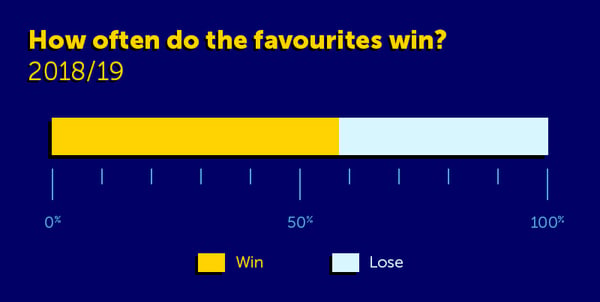Take a guess: how often do you think the favourites in a football match actually win? This blog answers that exact question, exploring why the favourites sometimes lose and what four things they can do to increase the likelihood of them winning.
This year, BT Sport asked the data experts at Google, Opta and Squawka to predict how the 2019/20 season of the Premier League will pan out. This resulted in The Script, a document detailing everything that should happen during the season, which led us to ask ourselves: how well can you predict the outcome of a football match or competition?
We can never be completely sure who’s going to win until it happens, but this use of data and AI can give us a pretty good idea. This led us to wonder: how often do the favourites actually win?
How often does the favourite football team win?
Let’s consider the 2018-2019 season. At InnerDrive HQ, we analysed every match in the 2019-19 Premier League season and found that favourites only win 57.9% of the time and, surprisingly, lose 42.1% of their matches. The graph looks like this:

We think it’s fair to say that many would expect favourites to win much more than they lose. However, we didn’t expect the difference between the number of times the favourites won and lost to be so small. So, why do the favourites lose, and how could they win more often?
Why do favourites lose?
Wrong expectations
Often, supporters and coaches assume that athletes will be more likely to win if they expect to. However, this is not always the case.
Low expectations can not only lower motivation, expectations can also cause arousal to fluctuate. This can cause athletes to choke play poorly for two reasons:
- If a footballer’s arousal is too low, then they will not play well as they may not be physically ready to perform or motivated.
- If their arousal is too high, they may play poorly as a result of physical tension or anxiety.
Less is more
A team knowing that they are the favourites and thinking they are going to win can cause problems, especially if they concede first. Often, when favourites concede first, they start to overthink what they should be doing. This can mean that their usual automatic play becomes jerky and littered with mistakes. Here, less can mean more.
Underdogs performing well
We sometimes think that favourites throw games away. What actually happens in some cases is that the ‘underdogs’ outplay their opponents. Think Leicester City, Iceland and Wales punching well above their weight.
One reason why underdogs are able to band together and ‘overachieve’ is due to their team culture. For elite sport teams, where performance excellence is a key element for success, a high performing culture is built through team values, beliefs and practices. Culture has shown to be important for nurturing optimal performance in Olympic teams too.
To find out more about how to enhance your team culture, check out this blog.
How football teams can win more
The best teams play to the top of their ability when it matters most – below are some easy tips for teams to do that:
Own your role
In every successful team, individual athletes with their own role work together towards a shared goal. A team only fulfils its potential when all of these individual roles are performed successfully and come together. Being clear about their role can increase footballers’ confidence and lower their anxiety.
Fail to prepare, prepare to fail
It’s not just the will to win, but the will to prepare to win that separates the good from the great. If footballers prepare well, focus their effort on processes within their control and do not see the use of their support system as a sign of weakness, they will have the best chance of performing when it really matters.
Keep calm and carry on
An footballer’s state of mind can be the difference between them flourishing or wilting under pressure. Clearly, the best flourish more than they wilt, because they understand that their reaction to pressure is their choice. Here is a simple guide on 10 ways to perform under pressure.
Final Thought
Whilst many would agree that there is a certain extent to which football can be predicted, the stats show it’s not always as clear cut as we think. So, while The Script is an impressive and very interesting piece of prediction, its findings should be taken with a grain of salt.
A sport psychologist’s tips for all teams this year would be to have realistic expectations, think clearly about what they need to do in order to win, never underestimate another team, know their roles within, have great preparation and learn to flourish and not wilt under the pressure of the Premier League.





